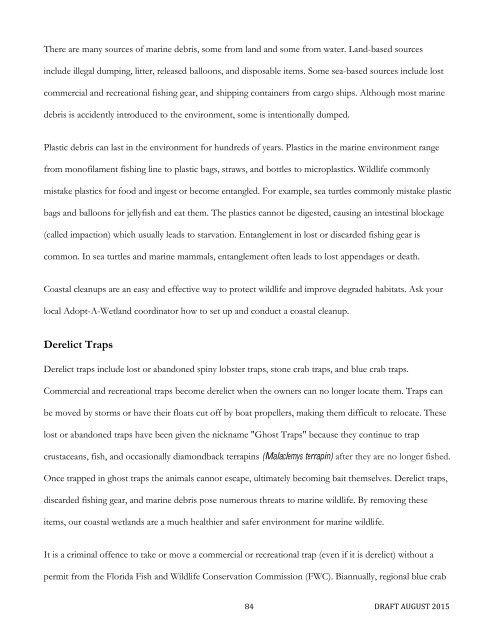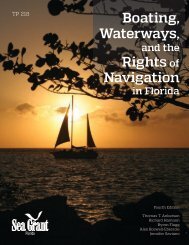Adopt-A-Wetland
XQDrg
XQDrg
You also want an ePaper? Increase the reach of your titles
YUMPU automatically turns print PDFs into web optimized ePapers that Google loves.
There are many sources of marine debris, some from land and some from water. Land-based sources<br />
include illegal dumping, litter, released balloons, and disposable items. Some sea-based sources include lost<br />
commercial and recreational fishing gear, and shipping containers from cargo ships. Although most marine<br />
debris is accidently introduced to the environment, some is intentionally dumped.<br />
Plastic debris can last in the environment for hundreds of years. Plastics in the marine environment range<br />
from monofilament fishing line to plastic bags, straws, and bottles to microplastics. Wildlife commonly<br />
mistake plastics for food and ingest or become entangled. For example, sea turtles commonly mistake plastic<br />
bags and balloons for jellyfish and eat them. The plastics cannot be digested, causing an intestinal blockage<br />
(called impaction) which usually leads to starvation. Entanglement in lost or discarded fishing gear is<br />
common. In sea turtles and marine mammals, entanglement often leads to lost appendages or death.<br />
Coastal cleanups are an easy and effective way to protect wildlife and improve degraded habitats. Ask your<br />
local <strong>Adopt</strong>-A-<strong>Wetland</strong> coordinator how to set up and conduct a coastal cleanup.<br />
Derelict Traps<br />
Derelict traps include lost or abandoned spiny lobster traps, stone crab traps, and blue crab traps.<br />
Commercial and recreational traps become derelict when the owners can no longer locate them. Traps can<br />
be moved by storms or have their floats cut off by boat propellers, making them difficult to relocate. These<br />
lost or abandoned traps have been given the nickname "Ghost Traps" because they continue to trap<br />
crustaceans, fish, and occasionally diamondback terrapins (Malaclemys terrapin) after they are no longer fished.<br />
Once trapped in ghost traps the animals cannot escape, ultimately becoming bait themselves. Derelict traps,<br />
discarded fishing gear, and marine debris pose numerous threats to marine wildlife. By removing these<br />
items, our coastal wetlands are a much healthier and safer environment for marine wildlife.<br />
It is a criminal offence to take or move a commercial or recreational trap (even if it is derelict) without a<br />
permit from the Florida Fish and Wildlife Conservation Commission (FWC). Biannually, regional blue crab<br />
84 DRAFT AUGUST 2015



